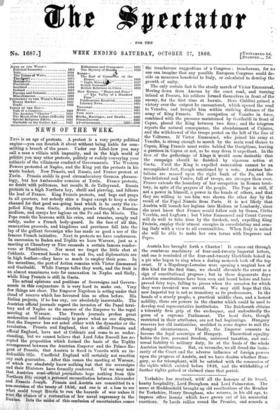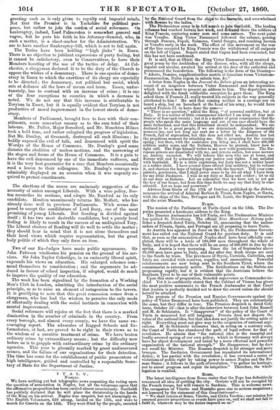Yorkshire -has received, With' all the honours of its bread,
hearty hospitality; Lard Brougham and Lord Palmerston. The scene at•lEaddersfield brought up old recollections of the Member for Yorkshire, Henry Brougham, who returns, in his old age, to impress other lessons whisk' have grown out of his senatorial exertion's. So Leeds rallies retina the Premier, and accords a
greeting such as is only given to royalty and. imperial minds. Not that the Premier is in Yorkshire for political pur- poses, but rather to join the cordon of social reformers. On bankruptcy, indeed, Lord Palmerston is somewhat general and vague, but he puts his faith in his Attorney-Geneial, who, in such a matter, is a sheet-anchor for the Administration. We are to have another Bankruptcy-bill, which is not to fail again. The Tories have been holding "high jinks " in Essex. There is no objection to jubilant expressions of party feeling, but it cannot be satisfactory, even to Conservatives, to have their Members boasting of the use of the tactics of delay. At Col- chester, a clergyman declared it to be the duty of the Church to oppose the wishes of a democracy. There is one species of demo- cracy in Essex to which the exertions of its clergy are especially to be directed; the democracy, not political but social, which sets at defiance all the laws of meum and teum. Essex, unfor- tunately, has to contend with an increase of crime ; it is one of the four exceptions to counties in which a decrease is noted. We do not say that this increase is attributable to Toryism in Essex, but it is equally evident that Toryism is not productive of moral improvement in the lowest strata of demo- cracy.
Members of Parliament, brought face to face with their con- stituents, seem somewhat uneasy as to the sum total of their labours. Mr. Puller, Major Beresford, and Mr. Monckton Mikes took a bold tone, and. rather eulogised the progress of legislation. But Mr. Dunlop, at Greenock, destroyed all such illusions ; he boldly exposed the evil of talk, and. denounced with spirit the Wordy% of the House of Commons. Mr. Dunlop's good sense dictates the abolition of useless motions, and the narrowing of the stages and forms of the House of Commons. It is a gain to have the evil denounced by one of the immediate sufferers, and it is the very best guarantee for a cure that Members occasionally read a lesson to their colleagues. Mr. Dunlop's courage was admirably displayed on an occasion when it was urgently re- quired to protect constituents.



























